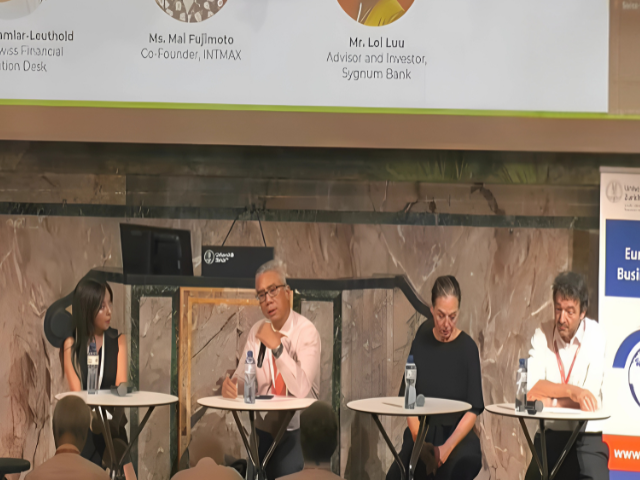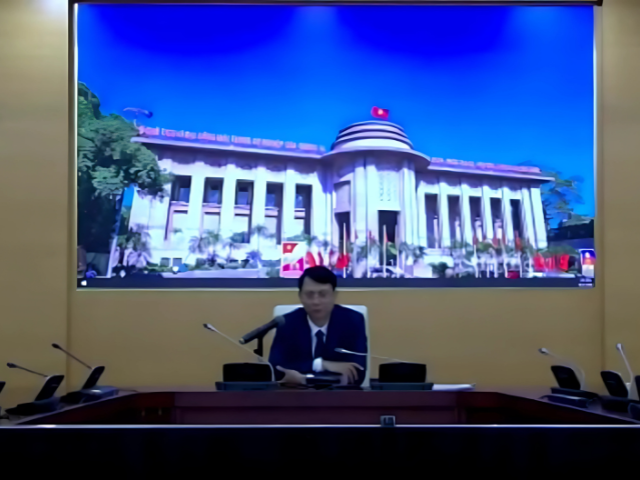At the Vietnam-Switzerland Economic Forum, Mr. Alfred Mettler, representing the Swiss Finance Institute (SFI), assessed that Vietnam is in a favorable position in terms of technology and young human resources and is fully capable of participating in the digital asset playground. However, he argued that the more important concern is not whether or not to “have crypto,” but how prepared the domestic financial system is to address fundamental challenges such as controlling bad debt, implementing international standards, and removing capital flow restrictions.

Mr. Alfred Mettler. Source: SFI
|
He pointed out that large investments and financial center development initiatives, no matter how well-designed, require smooth-flowing capital to be realized. If capital inflows and outflows remain tightly controlled, the ability to attract investors and build a competitive financial center will be very limited.
“This is something that the State Bank of Vietnam will have to address sooner or later,” he said.
In reality, Vietnam has a large number of individuals with financial potential, but most of this capital is sent to other markets for management, typically to Singapore. This reflects a gap in the asset management field, an area in which, according to Mr. Mettler, Vietnamese banks are still seeking direction by sending their senior leaders to Switzerland to learn the operating model.
Appreciating Vietnam’s technological potential, Mr. Mettler believed that Vietnam had “leapfrogged” many stages that took the West decades to perfect. However, he noted that technology is only the tip of the iceberg, while regulatory capacity, legal framework, and human resource development strategy are the determining factors for the sustainability of a financial center.
“When it comes to crypto or digital assets, I’m not worried about whether Vietnam can participate or not, because I believe it will happen naturally. Vietnam has a lot of well-trained people in technology, and this will be a great advantage when entering the era of digital finance,” said the representative of SFI.
“The question is how much Vietnam will allow capital to flow and how open it will be. In my opinion, these are far more important questions than the debate around digital assets or cryptocurrencies, not because they are less essential, but because, as I mentioned, Vietnam is actually in a quite good position, even ahead of some Western countries in this field.”
 Speakers discussing at the Vietnam-Switzerland Economic Forum. Screenshot
|
From an institutional perspective, Mr. Phung Anh Tuan, representing VCI Legal, said that the legal framework for the international financial center has been put on the agenda of the National Assembly and is likely to be approved at the June meeting. Accordingly, Ho Chi Minh City and Danang will be chosen as pilot sites, with a series of unprecedented reforms such as establishing a separate financial court, applying common law principles, and allowing the establishment of a digital asset exchange. Mr. Tuan evaluated that this is a rapid change never seen before after more than 20 years of discussion.
The State Bank of Vietnam (SBV) also expressed its determination to accompany this process. According to Mr. Le Anh Dung, Deputy Director of the Payment Department, the SBV is coordinating with ministries and branches to build a sandbox mechanism, allowing the experimentation of new models such as fintech, green finance, or encoded assets. Especially, the cities chosen as financial centers will be prioritized to implement flexible policies suitable for technology and innovation characteristics.
From international experience, Ms. Eva Selamlar-Leuthold, Head of Financial Innovation of the Swiss Government, emphasized the role of a “flexible but flexible” mechanism. She said that innovation cannot be regulated rigidly but needs an enabling institutional environment to develop.
According to her, Switzerland’s success is due to its focus on connecting the state, businesses, and academia, as well as attention to seemingly minor factors such as licensing time, tax procedures, or cross-border market access.
“Speed is the key to survival. No matter how good an idea is, if it cannot be implemented, it will forever remain in the drawer,” she said.
 Mr. Le Anh Dung, Deputy Director of the State Bank of Vietnam’s Payment Department, participated in the online discussion at the forum. Screenshot
|
From an investor’s perspective, Mr. Loi Luu, advisor and investor of Sygnum Bank, said that Vietnam needs an official dialogue channel between regulators and the innovation community. “Innovation always comes first, and policies are slower. If there is no clear communication framework, startups will struggle to experiment with new models,” he said. He believed that the establishment of a financial center is an opportunity to rebuild this mechanism from scratch towards openness and friendliness to creativity.
Agreeing with this view, Ms. Mai Fujimoto, founder of INTMAX, shared her story of having to leave Japan to start a business in Switzerland because the legal system in her home country could not keep up with the industry’s development pace, even though Japan is a pioneer in creating a legal framework for cryptocurrencies.
She emphasized that regulations need to be designed to protect users without stifling creativity and that Vietnam currently has a significant advantage with its young engineering workforce but needs to act soon to avoid falling behind in the global race.
From the stories of the leading countries and the ongoing reforms, it can be seen that Vietnam is ready in terms of political determination and technological capacity. However, to truly establish a financial center, capital needs to flow, bank governance needs to be standardized, and the financial market needs depth. As Mr. Mettler asserted, digital assets will come, but capital policies will determine whether Vietnam has the strength to create a financial center or not.
“The Push” for Vietnam’s Market Surge Past $100 Billion
With a total market value surpassing the $100 billion mark, Vietnam stands as a dynamic powerhouse and pioneer in the global digital asset industry.














































